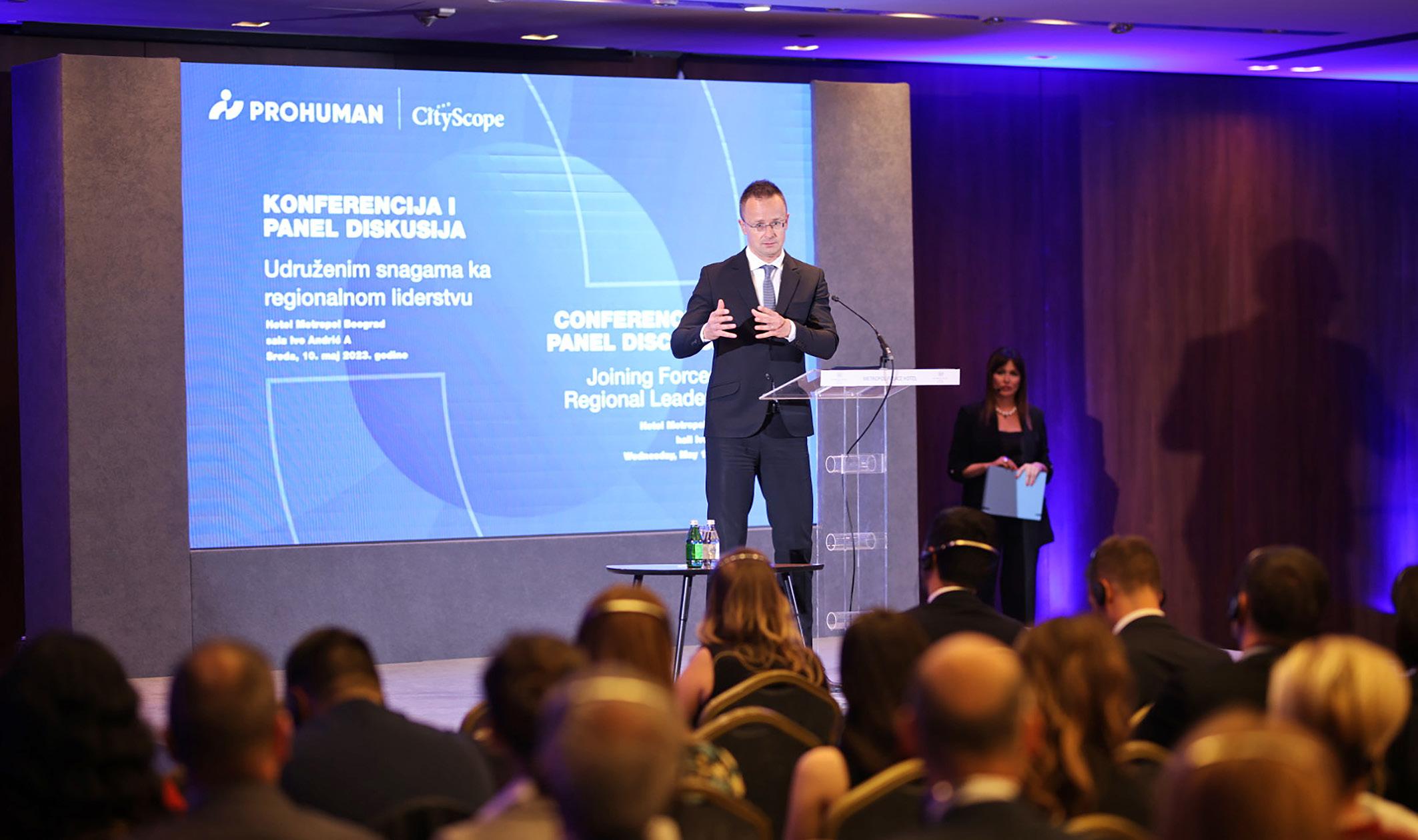TOP 50 EXECUTIVES

HR Businesses
HUF 6,990 • EUR 18 The Most Influential HR & Recruitment Executives in Hungary 2023

3 Foreword 4 HR EDITORIAL ROUNDUP 6 Hungarian HR Group Steps into Serbia, Expands Slovenian Brand 8 WHC Group Leads Way in HR Digitalization 11 Challenges and Trends for Next few Years 12 HR IT Systems Make Life Easier, Help Retain Staff 14 HR MARKET TALK 16 Market Talk: Temp Agencies say Busier Than Pre-COVID 18 Market Talk: Economic Challenges Shake a Tight Labor Market for Recruiters 24 HR EXECUTIVE BIOGRAPHIES 30 Sándor Baja 32 Tibor Bányai 34 Zsolt Beck 36 István Bojó 38 Zoltán Czellecz 40 István Ecsédi 42 Éva Fehér 44 Tamás Fehér 46 Attila Feleki 48 Róbert Göbl 50 Szilvia Gyarmati 52 József Illés 54 Ákos Jáhny 56 Csongor Juhász 58 Domenico Marra 60 László Mátyás 62 Magdolna Mihályi 64 Tammy Nagy-Stellini 66 Árpád Németh 68 Melinda Kovács Nyikosné 70 Dorottya Pákozdi 72 György G. Palásti 74 Zoltán Pataki 76 Dávid Pelle 78 Balázs Rácz 80 Gabriella Ruff 82 Viktor Stasztny 84 Rozália Tóth 86 Péter Vida Jr. 88 Anett Vidus 90 HR COMPANY LISTINGS 92 Top HR Companies in Hungary 94 Content Published in 2023 • EDITOR-IN-CHIEF: Robin Marshall • CONTRIBUTORS: Annamária Bálint, Mihály Kovács, Csilla Lengyel, Robin Marshall • LISTS: BBJ Research (research@bbj.hu) • NEWS AND PRESS RELEASES: Should be submitted in English to news@bbj.hu • LAYOUT: Zsolt Pataki • COVER PHOTO: tomertu / Shutterstock.com • PUBLISHER: Tamás Botka, Business Publishing Services Kft. • Address: Madách Trade Center, 1075 Budapest, Madách Imre út 13-14. • Telephone +36 (1) 398-0344, Fax +36 (1) 398-0345, • ADVERTISING: AMS Services Kft. • CEO: Balázs Román • SALES: sales@bbj.hu • CIRCULATION AND SUBSCRIPTIONS: circulation@bbj.hu • www.budapestbusinessjournal.com • ISSN 3003-9355
Foreword
Human resources executives have craved a place around the C-suite top table for years. A few have even found their way there, though they did not always find (or feel) that they were particularly valued. Post-COVID, the sense I have is that this might finally be changing.
For a start, the attention companies are prepared to pay their workforce, particularly around staff retention, has grown enormously. I suspect this is true in most parts of the world, but it is undoubtedly the case in Hungary, where labor markets are notoriously tight. Also coming into play are spiraling wages, set against the rising cost of living. Again, inflation is high everywhere, but it has been a particular problem in Hungary. The trend is finally heading in the right direction, but it is doing so from the highest rate in the European Union. The National Bank of Hungary put May’s CPI figure at 21.5%, down from 24% in April, 25.2% in March, and25.4% in February. It peaked at 25.7% in January.
Retaining staff and setting competitive compensation packages are the bread and butter of HR departments, and these are significant roles, but these are not where true value is added. Human resource teams must reach out to all departments, offering analytics that support decisionmaking, and becoming embedded in all senior management functions. And they are very well placed to do so.
As with so many sectors, the spread of new technologies (and hand-in-hand with that, the growing adoption of artificial intelligence) are beginning to have a revolutionary impact on how HR can work. One company we spoke to while pulling together this publication told us the global HR technology market is forecast to reach USD 36 billion within five years.
On these pages, you will find examples of this in action. One firm told us how, having introduced electronic signatures on commercial contracts, it is integrating labor and HR processes
to optimize time and costs. That’s important not just because it helps, in their case, with the easier management of temporary workers. It also increases colleague satisfaction.
“Inefficient, poorly organized processes can be a major contributor to employee churn (especially for Generation Y and Z), as they look for organizations with user-friendly, quality IT solutions across all elements […], including HR management issues and activities,” as one of our expert witnesses put it.
Nor should we make the mistake of thinking this is just for the big boys. Smaller companies will need to find software that matches their budget (a task that is becoming easier with time) if they are to stay competitive in no other field than hanging on to their staff.
“Working on automated and online platforms and exploring new technologies should also be part of our daily routine,” one HR executive shared.
Thirty-nine percent of respondents to a survey conducted by one of the Big Four consultancies said the automation of HR services would be one of their most critical focal points in the next three years. The same proportion thinks it will be a priority to introduce digital technology into HR beyond the basic record-keeping system.
It is foolish to say HR is an idea whose time has come. It has always been a vital function, although perhaps it hasn’t always been appreciated as one. As the focus intensifies on finding and keeping staff, and as technology advances to speed processes and create, store and interrogate data, perhaps HR executives can fully get their feet under the table and be comfortable doing so.
Robin Marshall MBE, Editor-in-chief Budapest Business Journal

4 TOP 50 EXECUTIVES IN HR BUSINESSES
HR EDITORIAL ROUNDUP

Hungarian HR Group Steps into Serbia, Expands Slovenian Brand
Budapest-based Prohuman group has further strengthened its CEE operations spanning seven countries by acquiring Serbia’s CityScope Group. The group, which says it has “national champion” status in Hungary, has declared its ambition is to become the number one player in the CEE region by 2024.
By BBJ Staff
The acquisition of CityScope Group was officially announced at an event in Belgrade, on May 10, by Sándor Zakor, co-founder and co-owner of Prohuman Group, who was joined by Ivana Milošević, founder and CEO of CityScope. High-level political support was also on display, with the foreign ministers of both Hungary and Serbia attending the event.
Founded and owned by Hungarian executives, Prohuman has grown over the past 20 years from a small firm in Budapest to a market-leading HR service provider. It employs 20,000 people daily and provides complex HR services to more than 1,000 corporate clients.

8 TOP 50 EXECUTIVES IN HR BUSINESSES
Hungary’s Minister of Foreign Affairs and Trade, Péter Szijjártó.
WHC Group Leads Way in HR Digitalization
A Hungarian HR company says it is pioneering the use of artificial intelligence and chatbots to alleviate the labor shortage and reduce labor documentation costs by 60%.
By BBJ Staff
Hungary’s WHC Group has used professional artificial intelligence solutions in its communication processes for several years. A few months ago, the company introduced its latest chatbot, which facilitates the coordination of employees from abroad and daily contact with them. The company has also been at the forefront of using electronic signatures in employment processes, at both national and European levels, to the extent that it says they are now almost entirely automated.
The global HR technology market is forecast to reach USD 36 billion within five years. This year, hybrid working environment solutions, cloud-based systems, recruitment technologies, artificial intelligence, workflow automation and paperless solutions (electronic document management) are expected to lead a digital transformation in HR.

The WHC Group, which employs nearly 5,000 people (the vast majority of them temporary workers), says it has been using AI-based chatbot solutions for internal employee communication for several years, taking a significant burden off colleagues managing labor processes.
With that experience under its belt, the company says it is continuously looking for automation and digital solutions to help it optimize its HR processes. One of its latest developments, following the introduction of electronic signatures on commercial contracts, was the integration of labor and HR processes to optimize time and costs, increasing colleague satisfaction and facilitating the easier management of temporary workers.
“WHC has achieved outstanding efficiency gains with the new system: labor processes have been accelerated by 40%, and labor documentation costs have been reduced by more than 60%,” says Flóra Szabó, a senior IT business partner at the HR firm.
11
Graphic by ImageFlow / Shutterstock.com
HR IT Systems Make Life Easier, Help Retain Staff
While the use of human resource IT systems is common to all large companies, and more than 80% of medium-sized companies use technological tools to support HR processes, two-thirds of small companies have no such solution in place. Consultancy
Deloitte believes all businesses must embrace HR tech, regardless of size.
By BBJ Staff
The cloud-based human capital management (HCM) system, considered the most advanced today, allows organizations to store employee data in a single, easily accessible, secure online location and to access it instantly, anytime, anywhere, from any device with an internet connection. Apart from making paperwork easier, they can also play a critical role in staff retention.
“Inefficient, poorly organized processes can be a major contributor to employee churn (especially for Generation Y and Z), as they look for organizations with user-friendly, quality IT solutions across all elements […], including HR management issues and activities,” warns Martin Csépai, head of Deloitte Hungary’s HR consulting business.
The advantage of these HCM solutions over on-premises systems lies in their flexibility. Their modular design allows a firm to decide which functions to implement to meet its HR needs today, depending on its size
and the industry, while leaving the door open to add other modules down the line, if and when the need arises.
Modern HCM systems on the international market provide full HR functionality thanks to their modular design, and the efficient functioning of the interconnections between elements is apparent.
For companies with more than 1,000 employees, the cost of implementing an integrated HCM system can be a return on investment in the short term, says Deloitte. Above this size, there is an absolute need for centralized and time-efficient management of HR-related issues and tasks.
In most cases, an HR IT infrastructure in the cloud eliminates the requirement for paper storage of employee files. All employee-related documents can be securely stored digitally in the cloud and are easily accessible to HR for compliance and reporting requirements, reducing the administrative burden on the business.
TAILORED AI
Deloitte Hungary is a leading professional services organizations, with more than 1,000 national and specialized expatriate professionals. Services in Hungary are provided by Deloitte Auditing and Consulting Limited (Deloitte Ltd.), Deloitte Advisory and Management Consulting Private Limited Company (Deloitte Co. Ltd.) and Deloitte CRS Limited (Deloitte CRS Ltd.), which are affiliates of Deloitte Central Europe Holdings Limited. Legal services are provided by cooperating law firm Deloitte Legal Göndöcz and Partners Law Firm.
One efficient way to implement access is the employee portal, which, as the name suggests, brings together information in a well-structured and searchable way on a page that is easily accessible to employees, Deloitte says.

The most advanced HCM platforms use AI to offer content and solutions tailored to a given situation based on the analysis of intranet searches or at specific points in the employee lifecycle: examples include automatic reminders sent by the system to new entrants to complete mandatory training or expectations related to specific career levels and the offer of training opportunities provided by the company in connection with an appointment.
The cloud-based HR IT solution can be easily integrated with the company’s existing software systems and used to manage master data. So, if an employee record or file needs to be updated, HR can easily make the change in one place automatically.
14 TOP 50 EXECUTIVES IN HR BUSINESSES
Martin Csépai, head of Deloitte Hungary’s HR consulting business.
HR MARKET TALK

Market Talk: Temp Agencies say Busier Than Pre-COVID
As businesses fought to stay afloat during the coronavirus pandemic, the first inclination of many was to let temporary workers go first and hang on to salaried employees (in whom they had invested more) for as long as possible. The effect was to flood the labor market with talent. Since the economy began to recover, the labor shortages have returned. Some of the leading players in the field tell the Budapest Business Journal about the most significant factors keeping people on the move.
By BBJ Staff
BBJ: How has the demand for temporary workers in the job market changed over the past few years?
Zoltán Czellecz: Demand for our services has been steadily growing yearly, bar the downturn during the COVID-19 months. In this candidate-driven market, employers prioritize the ability to identify and attract the right talent; the form of employment is secondary.
Viktor Göltl: Hungary’s temporary employment market has experienced significant fluctuations over the past three years due to the COVID-19 crisis and the war in Ukraine. However, these fluctuations are characteristic of the industry, and overall, the market has been making slight gains in volume.
Ákos Jáhny: We saw a peak in the pre-COVID-19 period; it decreased during the pandemic. However, since 2022, we have seen an impressive increase, and now we observe that the demand level roughly surpasses 2019.
OUR TEMP MARKET TALK PANEL
• Zoltán Czellecz, CEO, Work Force
• Viktor Göltl, CEO, WHC
• Ákos Jáhny, CEO, Get Work Trend
• Csongor Juhász, managing director, Prohuman
• Péter Laczi, chief operating officer, Pannon-Work
• Csaba Ottó, CEO, Man at Work
• László Zsilka, chief marketing officer, HSA Group
Csongor Juhász: The economy has recovered from the COVID-19 recession; companies are employing a large proportion of temporary workers again. The labor shortage has become a serious problem again in almost all industries, and demand for labor has grown beyond the COVID-19 levels. Agencies providing temporary workforce can be great partners in answering such employment pressures.
Péter Laczi: The demand for our services has changed positively in recent years. As recruitment becomes more complex, the need for this activity is increasing. The introduction of the ability to employ third-country nationals has also contributed significantly to this growth and helps to meet staff demand. Without this approach, securing staff would be impossible, so this has been an essential step in boosting economic performance and retaining existing jobs.
Csaba Ottó: The turbulent economic changes of recent years (COVID-19, raw material shortages, and war) have resulted in booms and busts in the labor market, which have been felt in the temporary agency market too. We have had to persist in this changing world in the previous years and help both our partners and temporary workers with progressive and new solutions. László Zsilka: More people realize the potential of temporary employment; however, the constantly-changing labor market should not be forgotten either, as this is primarily the reason why the sector is growing year by year. Labor shortages and the brain drain encourage employers to keep staff numbers up. In short, demand has adjusted to the trends.
18 TOP 50 EXECUTIVES IN HR BUSINESSES
Market Talk: Economic Challenges Shake a Tight Labor Market for Recruiters
During the COVID years, employees were reluctant to look for new jobs. The postcoronavirus boom followed, then supply chain issues, war, high inflation and rising wage demands, bringing with them new dynamics to what remains a tight labor market. The Budapest Business Journal invited some of Hungary’s most prominent recruitment agency professionals to give us a better understanding of the market.
By BBJ Staff
BBJ: What is the current state of the job market, and how has it affected the recruitment industry?
Domenico Marra: The job market in Hungary has experienced a steady growth trajectory since 2019, primarily due to increased economic growth and multinational investments. While the outlook for
OUR MARKET TALK PANEL
• Domenico Marra, Head of Operations
Hungary, Adecco
• Zsolt Beck, executive director and owner, Beck & Partners International HR
• György G. Palásti, country manager, Gi Group Holding in Hungary
• Tammy Nagy-Stellini, managing director, Hays Hungary
• Gabriella Ruff, managing partner, Karrier Hungária
• Tamás Fehér, managing director, Manpower Hungary & Croatia
• Sándor Baja, managing director Czech, Hungary, Romania, Randstad Hungary
the job market in Hungary is optimistic, it remains crucial for employers and staffing agencies to remain flexible and adaptable to any unforeseen changes that may arise.
Zsolt Beck: This year brought a significant change in the Hungarian job market. After the shock of the energy crisis, the economy had started to recover by the end of last year, but one thing can be seen very clearly: there is a general labor force shortage in almost every segment. Parallel to this, due to cost-cutting policies, our clients have reduced recruitment costs, meaning they are trying to solve their recruitment needs themselves first.
György G. Palásti: Our labor market survey found that the upcoming year poses challenges for business leaders and human resources managers as they must focus on high inflation, increasing employee wage demands, the economic slowdown, and low turnover rates while retaining the best talent. Most companies may succeed in this by raising wages in line with employee expectations. Companies that can increase real wages will likely face fewer turnover issues than those that do not or only marginally increase salaries.
Tammy Nagy-Stellini: Companies are keener to get market insights, salary benchmarks, and any information to enable them to make smart decisions. In the uncertain economic climate, most companies choose cautious planning. Employee retention is the top priority for employers; companies would rather increase salaries further than let valuable experts go.
24 TOP 50 EXECUTIVES IN HR BUSINESSES
HR EXECUTIVE BIOGRAPHIES

HR COMPANY LISTINGS

Top HR Companies in Hungary
LISTED IN ALPHABETICAL ORDER
1052
1012
1119 Budapest, Bártfai utca 15-17. (20) 999-9250 info@bap.hu
1134 Budapest, Váci út 23-27. (1) 266-2420 info@bluebird.hu
1054 Budapest, Kálmán Imre utca 1. (80) 315-096 dekra@dekra-arbeit.hu Develor
1074 Budapest, Rákóczi út 70–72. (1) 413-7990 info.hungary@develor.com
Diepeveen
Heincz (50) (–)
Pataki, Norbert Heincz
(–) Ildikó Anna Magura, Gábor Péter Gyimesi
435 Tímea Bíró (100) (–)
Tímea Bíró
1007
859-3015 frido.diepeveen@diepeveenpartners.com
1138 Budapest, Madarász
2724 Újlengyel, Nyári Pál utca 65. (1) 225-7313 eujobs@eujobs.hu
1146 Budapest, Zichy Géza utca 5. (1) 422-1714 flow@flow.hu
1138 Budapest, Váci út 135-139. (70) 883-7514 info@focusconsulting.hu
FP Invest Trade Kft. www.tesk.hu
Individuals (100) (–)
Hajnalka Bánovics, Péter Tokár
Árpád Németh (50), Zoltán Pethő (50) (–) Árpád Németh
1126 Budapest, Derkovits utca 9. (1) 801-8888 hungary@friisberg.com
1076 Budapest, Garay tér 20/B (1) 445-1209, (30) 950-8818 info@tesk.hu Friisberg & Partners International Kft. www.friisberg.com 548
94 TOP 50 EXECUTIVES IN HR BUSINESSES COMPANY WEBSITE TOTAL NET REVENUE (HUF MLN) 2022 OWNERSHIP (%) HUNGARIAN NON-HUNGARIAN TOP LOCAL EXECUTIVE ADDRESS PHONE E-MAIL Adecco Kft. www.adecco.hu 9,669 (–) The Adecco Group AG (100) Domenico Marra
Budapest, Fiastyúk utca
(1)
adecco@adecco.hu Arthur Hunt Kft. www.arthur-hunt.hu 541 (2021) Individuals (30) A2H SARL (70) Krisztina Krokos Dávidné, Gábor Áldott, Máté Seres
1139
4–8.
323-3500
Bányai & Partners Consulting Kft. www.banyaiconsulting.hu 476 Tibor Bányai (50), Szabolcs Bányai (50) (–) Tibor Bányai
Budapest, Vármegye utca 3–5. (1) 361-3612 arthurhunt@arthurhunt.hu
(1)
Beck and Partners Kft. www.bap.hu 793 Zsolt Beck (100) (–) Zsolt Beck,
Somodi
Budapest, Logodi utca 44/b
950-6081 info@banyaiconsulting.hu
Bettina
Bluebird International Zrt. bluebird.hu 3,110 Balázs Réfi (100) (–) Balázs Réfi
Arbeit Magyarország Kft. www.dekra-arbeit.hu 321 (2021) (–) DEKRA Arbeit GmbH (100) Radoslav Sekerka
DEKRA
Tanácsadó Zrt. www.develor.hu 596 (2021) Individuals (100)
Csaba Szabó
(–)
& Partners Kft. www.diepeveenpartners.com 312 (–) Frido Cornelis Diepeveen (100) Frido Cornelis Diepeveen
eSense Human Resources Szolgáltató Zrt. www.esense.hu 2420 (2021) 5Stars Holding Zrt. (100) (–) Gábor Varga
Budapest, Danubius Grand Hotel Margitsziget (30)
Viktor utca 47–49. (1)
esense@esense.hu EU-DIÁKOK Iskolaszövetkezet www.eudiakok.hu 3,391 (2021) – Zoltán Pataki 7184 Lengyel, Petőfi utca 15. (1)
eucsoport@eucsoport.hu EU-Jobs Kft. www.eujobs.hu, www.eujobshrgroup.hu 7,060 Zoltán Pataki (50), Norbert
555-1585
225-1533
Zoltán
Flow Consulting Kft. www.flow.hu 802 (2021) Individuals (100)
Focus Consulting Kft. www.focusconsulting.hu
227
(2021)










